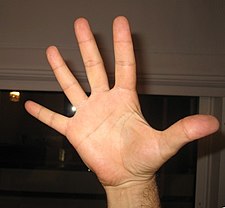Moutza

A Moutza ( Greek μούτζα múdza ) Mountza ( μούντζα múndza ) or Faskeloma ( φασκέλωμα fɐsˈce̞lo̞mɐ ) is a traditional gesture of insult in Greece : For the gesture, all fingers of one or both hands are stretched out and the palm (s) in the direction of the person to be insulted Person shown in a forward motion.
The gesture is often done in connection with the exclamations na ( να , 'here'), orse ( όρσε 'There you have it') or par 'ta ( παρ' τα , 'take that'), as well as swear words. The closer the gesture is to the other person's face, the more threatening it is thought.
An even more offensive version is achieved by using both hands to double the gesture. The palm of one hand is hit against the back of the hand of the other hand.
When Greeks want to point the number 5 with their fingers, take care not to stretch their fingers too much or point the palm of their hand towards the other person so it doesn't get mistaken for a moutza.
origin
The origin of the gesture can be traced back to ancient times when it was used as a curse. The Moutza is said to have supported curses against evil for the Mysteries of Eleusis . At that time it was called faskéloma ( φασκέλωμα ); this word and the variant faskelo are still synonyms of Moutza .
Later the name changed to Moutza . According to the Criminal Code of the Byzantine Empire , a chained criminal was led backwards through the city on a donkey, his face smeared with sweat slag ( μούντζος moutzos ) to mock them even more.
Because the sweat slag was first collected in the palm of the hand and then wiped on the person's face with outstretched fingers, the gesture itself also got the offensive meaning and the name Moutza after the material used. The modern Greek word moutzoura or mountzoura for a smudge has the same origin.
In other countries
The gesture of the moutza does not have the same meaning in other cultures. Similar gestures exist in some countries. Their meanings are:
- In Armenia : Raising your palm abruptly in the direction of another person means "I curse you", but it can also mean "I can't take you anymore" when a close relative (usually mother or grandmother) or friend shows it.
- In Iraqi culture, abruptly stretching the palm of your hand in the direction of another person means they should be ashamed and dishonorable.
- In Sindh , showing the palm of your hand is also an insult, the gesture is called a bunda .
- In North America there has been a similar gesture called "Talk to the hand" since the 1990s, meaning "hold your breath" or "shut up".
- In Mexico it can be used as a greeting (together with waving), but as a movement in the direction of the other person meaning "You will see" (Spanish: Vas a ver / Ya verás / Ya lo verás) and as a warning that the pointer will inform an authority figure (parent, teacher) of a prank. It is often used on children to encourage them to behave.
- In Panama , in addition to the meaning in Mexico, there is also a threat to the recipient that he will receive punishment or retribution.
- In Nigeria it has an insulting meaning for certain tribes, often in connection with the exclamation waka ("your father").
Individual evidence
- ↑ The double Moutza can be seen in a promotional video for Aegean Airlines from position 0:26.
literature
- Phaedon Koukoules, "Life and culture of the Byzantines", addendum 5, 1986
Web links
- Moutza in Greek cinema
- Footballer Dario Fernandez shows the referee a moutza

